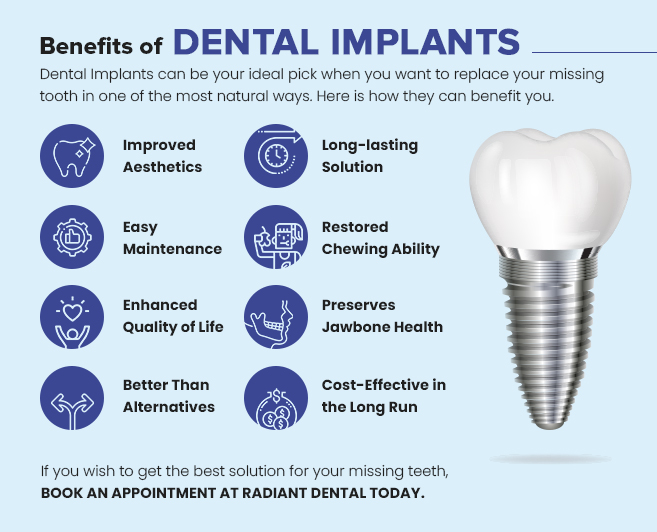3 Types of Dental Implants and Which One is Best for You?
Your smile is the first thing many people notice about you, and having a set of strong and healthy teeth can boost your confidence immensely. However, if you’re experiencing tooth loss due to various reasons such as cavities, gum disease, or injury, you might be considering dental implants. Dental implants are artificial tooth roots that provide a permanent base for fixed, replacement teeth. They’re an effective, long-term solution for people who suffer from missing teeth, failing teeth, or chronic dental problems.
If you’ve heard about dental implants but aren’t sure what they are, you’ve come to the right place. This blog post aims to educate you about the different types of dental implants, what factors influence the choice of dental implants, where to get dental implants in chennai, and more.
Understanding the Need for Dental Implants
Before we delve into the types of dental implants, let’s first understand why they are necessary. Missing teeth don’t just affect your appearance but also have a significant impact on your oral health. When a tooth is missing, the other teeth around the gap can move, leading to a change in your bite, potential gum disease, and even bone loss in your jaw.
Dental implants are the closest you can get to healthy, natural teeth. They allow you to live the way you want to – confidently eating, smiling, laughing, talking, and enjoying all of your everyday activities without worrying about your teeth. They’re designed to look, feel, and function like your natural teeth.
Three Types of Dental Implants
There are three main types of dental implants available – Endosteal implants, Subperiosteal implants, and Zygomatic implants. The type of dental implant that is right for you will depend on your specific situation, including your overall health, the health of your jawbone, and your budget.
Endosteal Implants:
Endosteal implants are the most common and widely used type of dental implant. They are typically made of titanium and are shaped like small screws or cylinders.
These implants are surgically implanted directly into the patient’s jawbone.
Benefits:
Stability: Endosteal implants offer excellent stability because they are anchored securely in the jawbone. This stability makes them suitable for single tooth replacements as well as for supporting bridges and dentures.
Longevity: With proper care and maintenance, endosteal implants can last a lifetime. They are a durable and reliable option for replacing missing teeth.
Natural Appearance and Function: Endosteal implants provide a natural look and feel. They allow for normal biting and chewing, and the artificial teeth attached to them closely resemble natural teeth in terms of aesthetics.
2. Subperiosteal Implants
Subperiosteal implants are used when the patient’s jawbone is shallow and cannot support traditional endosteal implants. These implants consist of a metal frame placed under the gum but either on or above the jawbone.
Unlike endosteal implants, subperiosteal implants do not require drilling into the jawbone. Instead, the metal frame is placed on top of the bone and beneath the gum tissue.
Benefits:
Suitability for Shallow Jawbone: The primary benefit of subperiosteal implants is that they can be used when a patient’s jawbone is not deep enough to support endosteal implants. This provides a solution for individuals who might not otherwise be candidates for dental implants.
Reduced Surgical Complexity: Subperiosteal implants involve a less invasive procedure compared to endosteal implants. This can mean quicker healing and less discomfort for the patient.
Stabilized Dentures: Subperiosteal implants are often used to stabilize removable dentures, improving their retention and function.
3. Zygomatic Implants:
Zygomatic implants are the least common type of dental implant. They are used when the patient’s upper jawbone lacks the necessary structure to support traditional endosteal implants.
Zygomatic implants are placed in the cheekbone (zygoma) rather than the jawbone.
Benefits:
Suitability for Severe Bone Loss: Zygomatic implants are used in cases of severe bone loss in the upper jaw where traditional implants may not be an option. They provide an alternative for patients with inadequate bone structure.
Avoiding Bone Grafting: With zygomatic implants, there’s often no need for bone grafting procedures, which can be time-consuming and require additional healing time.
Efficient Tooth Replacement: Zygomatic implants allow for efficient and stable tooth replacement in challenging cases, improving the patient’s ability to eat, speak, and smile confidently.
Benefits of Dental Implants


Detailed Analysis of Each Type of Dental Implant
Each type of dental implant has its own set of advantages and potential drawbacks, and the best choice for you will depend on your individual circumstances.
Endosteal implants are usually the first choice for many patients. They are safe, effective, and work well for most patients who are in good general health and have sufficient bone in their jaw to support the implant.
Subperiosteal implants, on the other hand, are a good option for patients who can’t wear conventional dentures and those who don’t have enough bone height in their jaw for endosteal implants. They sit on top of the bone, but under the gum line, making them a viable option for many people.
Lastly, Zygomatic implants are complex and are only considered if there isn’t enough jawbone for the two aforementioned types. The procedure to fit them is more complicated and has a longer recovery time.
Factors Influencing the Choice of Dental Implants & Dental Implant Cost
Dental implants are considered the gold standard in dentistry, as they are an ideal solution for missing teeth and all related problems. However, not every case is suitable for a dental implant, and not every implant is suitable for every case. The dentists will help you analyse which implant is best suited, and the dental implant cost is also determined by the type of implant required.
- Jawbone Health and Structure: Bone density and quality influence the choice between different implant types.
- Overall Health and Medical History: General health, medical conditions, and medications impact implant candidacy.
- Oral Health: Good oral hygiene and addressing gum disease are essential for implant success.
- Oral Habits: Smoking and habits affecting oral health may affect implant outcomes.
- Location and Number of Missing Teeth: The specific missing teeth and their quantity determine implant placement and restoration.
- Aesthetic Considerations: Appearance and blending with natural teeth guide implant and restoration choices.
- Patient Preferences: Patient expectations and preferences play a role in implant selection.
- Cost and Budget: Budget considerations influence implant choices and financing options.
- Timeframe: Implant procedures may have varying timelines for restoration.
- Implant Specialist’s Expertise: The experience of the oral surgeon or dentist is crucial in selecting the right implant.
Making the Right Choice for Your Dental Implants
Choosing the right type of dental implant for you is a decision that should be made in consultation with your dentist or oral surgeon. They will assess your oral health and discuss your goals and preferences to help you make an informed decision.
If you’re ready to take the next step towards a healthier, more confident smile, reach out to Radiant Dental today. We can help you decide which implant is the best for you based on your dental design and requirements. Through the expert dentists at Radiant Dental, you can be sure that you are in excellent hands. Book an appointment today.


